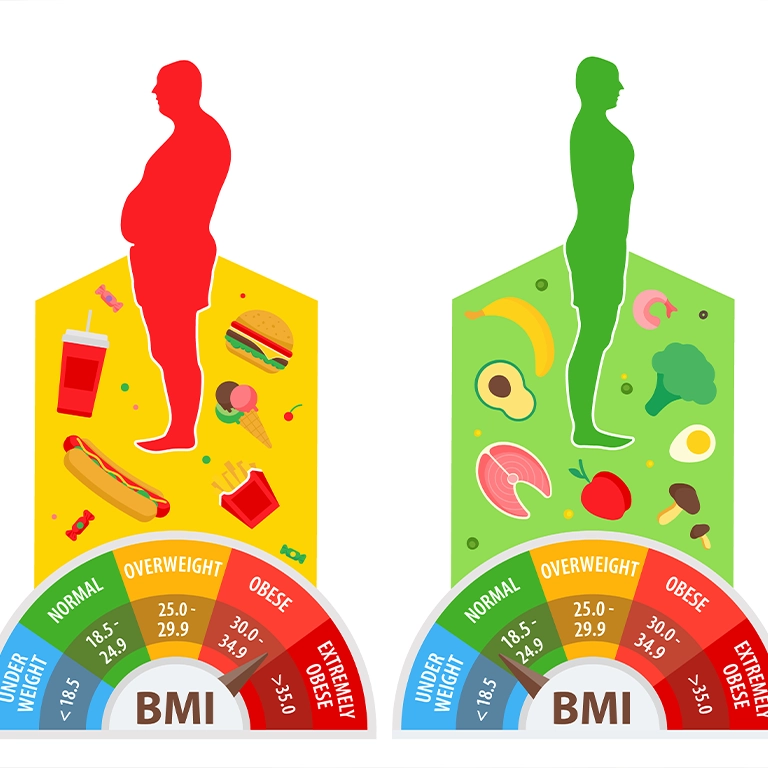What are the Causes of Obesity? Obesity is a chronic health condition characterized by excessive body fat accumulation that stores in the body as fat, increasing the risk for obesity-related issues like heart disease and type 2 diabetes. The causes of overweight and obesity are multifaceted, involving genetics, lifestyle choices and environmental factors that contribute to weight gain and make it difficult for people who are overweight to achieve a healthy weight.
Understanding these causes is vital for individuals living with obesity to take actionable steps toward better health. Factors such as eating habits, lack of physical activity and underlying health conditions like an underactive thyroid gland or syndrome and polycystic ovary syndrome can all play a role. Addressing these factors can help you lose weight and reduce the risk of developing potentially serious health conditions.
What is Obesity?
What is Obesity? Defining obesity involves assessing body mass index (BMI), a measure of body fat based on height and weight. A BMI of 30 or higher indicates obesity, while a BMI between 25 and 29.9 suggests overweight. Obesity is a complex condition that doesn’t solely result from eating too much, as it involves many causes, including biological and environmental influences that may cause overweight or obesity.
Obesity can lead to serious health consequences, such as high blood pressure, diabetes and heart disease. It is an increasingly common issue globally, affecting both adults and children. Recognizing obesity and overweight as chronic conditions helps people who are overweight seek appropriate interventions to manage their body weight effectively.

Obesity Types
Obesity Types Obesity can be categorized into different types based on its causes and manifestations. General obesity, characterized by high amounts of body fat distributed throughout the body as fat, is the most common type. Central obesity, where fat accumulates around the waist, increases the risk of heart disease and is often measured by waist circumference.
Another type is childhood obesity, which affects children aged 10 to 11 and younger, often due to poor eating habits or lack of physical activity. Each type of obesity may require tailored approaches to treat obesity, such as lifestyle changes or medical interventions, to address specific health risks and reduce the risk for obesity-related complications.
Childhood Obesity
Childhood Obesity Childhood obesity is a growing concern, as it significantly impacts the health of young individuals. Children with obesity are at higher risk for developing conditions like type 2 diabetes and high blood pressure, which can persist into adulthood. Factors like eating too much processed food and lack of physical activity usually cause weight problems in children, contributing to weight gain.
Environmental factors, such as limited access to healthy food or safe spaces for exercise, also increase your risk of childhood obesity. Addressing this issue involves fostering healthy eating habits and encouraging kids to be physically active to maintain a healthy weight and reduce long-term health risks.
What Causes Obesity?
What Causes Obesity? The cause of obesity is complex, involving a mix of genetics, lifestyle and environmental factors. Genetics can influence how the body stores fat or processes calories, making some individuals more prone to gain weight. Eating habits, such as consuming more calories than needed or eating foods high in sugar and fat, also cause weight gain and may cause overweight in susceptible individuals.
Lack of physical activity is a major contributor, as it prevents the body from burning excess calories. Underlying health conditions, like syndrome and polycystic ovary syndrome or an underactive thyroid, may contribute to weight gain, making it harder to maintain a healthy weight. Lack of sleep can also increase your risk, as it disrupts hormones that regulate hunger and metabolism.

When to See a Doctor if You Feel Obese
When to See a Doctor if You Feel Obese If you’re concerned about obesity or overweight, consulting a weight loss management health professional is crucial. You should see a doctor if your BMI exceeds 30, you experience symptoms like fatigue or joint pain, or you notice health problems associated with obesity, such as high blood pressure or a condition that causes interrupted breathing during sleep (sleep apnea).
A doctor can diagnose obesity using BMI, waist circumference and medical history to assess underlying health conditions. Early intervention can help you manage obesity and reduce the risk of developing potentially serious health conditions, guiding you toward effective treatments like lifestyle changes or medicine.
What Raises the Risk of Overweight and Obesity?
What Raises the Risk of Overweight and Obesity? Several risk factors increase your risk of developing overweight or obesity. Lack of physical activity and poor eating habits, such as consuming foods high in calories, are primary contributors that usually cause weight problems. Environmental factors, like easy access to unhealthy food options, also increase your risk.
Medical conditions, such as an underactive thyroid gland or syndrome and polycystic ovary syndrome, can cause weight gain. Certain medications, like antidepressants or other medicine, may contribute to weight gain as a side effect. Addressing these risk factors through lifestyle changes can significantly reduce your risk for obesity.

Why Are More People Overweight or Obese Now?
Why Are More People Overweight or Obese Now? The prevalence of obesity has risen due to changes in modern lifestyles and environments. Increased availability of foods high in sugar and fat, combined with larger portion sizes, leads people who are overweight to consume more calories a day than needed. Sedentary lifestyles, with reduced physical activity due to desk jobs or screen time, also contribute to weight gain.
Environmental factors, such as urban designs that discourage walking, and socioeconomic barriers to accessing healthy food further exacerbate the issue. Lack of sleep also plays a role, as it can disrupt appetite regulation, increasing the risk for obesity. These factors explain why obesity is an increasingly common problem globally.
Obesity Overview
Obesity Overview Obesity is a chronic condition that affects millions, defined by excessive body fat that stores in the body as fat, increasing the risk of serious health conditions. It is measured using BMI, with a value of 30 or above indicating obesity. Obesity can cause a number of health issues, including heart disease, type 2 diabetes and sleep apnea, a condition that causes interrupted breathing during sleep.
Managing obesity involves a combination of healthy eating, physical activity and sometimes medical interventions like medicine or surgery. Understanding the symptoms and causes of obesity is key to developing effective strategies to maintain a healthy weight and improve overall health.

Obesity Symptoms
Obesity Symptoms Symptoms of obesity include visible weight gain, increased waist circumference and physical signs like shortness of breath or joint pain. People with obesity may also experience fatigue, difficulty sleeping due to lack of sleep or low energy levels, as excess body weight places strain on the body.
Obesity can also affect mental health, leading to low self-esteem or depression. Recognizing these symptoms early allows individuals to seek help from a health professional to diagnose obesity and address underlying health conditions before they become potentially serious health issues.
Is Obesity Common in the US?
Is Obesity Common in the US? Obesity is highly prevalent in the US, with the Department of Health reporting that over 40% of adults and a significant number of children are living with obesity. The prevalence of obesity has increased over recent decades due to factors like poor eating habits, lack of physical activity and environmental influences that cause weight gain.
This high rate of obesity and overweight increases the risk of serious health consequences, such as diabetes and heart disease, making it a major public health concern. Addressing this issue requires widespread efforts to promote healthier lifestyles for people who are overweight or obese.

What Are the Most Dangerous Foods That Make You Obese?
What Are the Most Dangerous Foods That Make You Obese? Foods high in sugar, unhealthy fats and refined carbohydrates are among the most dangerous for causing obesity. Sugary drinks, fast food and processed snacks contribute to weight gain by providing high amounts of calories with little nutritional value. These foods can lead to consuming more calories a day than needed, storing excess energy in the body as fat.
Eating too much of these foods disrupts the body’s ability to maintain a healthy weight, as they are often low in fiber and nutrients. Choosing healthy food options, like fruits, vegetables and whole grains, can help prevent obesity and support weight loss for people who are overweight.
Treating Obesity
Treating Obesity Treating obesity involves a multifaceted approach, including lifestyle changes, medical interventions and sometimes surgical options. Increasing physical activity and adopting healthy eating habits are foundational steps to help you lose weight. Gradually increasing the amount of exercise and choosing nutrient-rich foods can significantly reduce body fat and the risk for obesity-related issues.
Medical treatments, such as medicine to treat obesity, may be prescribed for those with underlying health conditions like syndrome and polycystic ovary syndrome. For some, surgical options provide effective solutions, performed by highly experienced teams to ensure optimal outcomes and address potentially serious health conditions.

Obesity Surgeries at International Plus
Obesity Surgeries at International Plus For individuals struggling with obesity, surgical options like gastric balloon and gastric sleeve offer life-changing solutions. The gastric balloon is a non-surgical procedure where a balloon is placed in the stomach to reduce hunger, helping patients consume fewer calories and avoid weight gain. The gastric sleeve, a surgical procedure, reduces stomach size to limit food intake and promote weight loss.
At International Plus, these procedures are performed by a highly experienced and skilled team dedicated to patient care. Their expertise ensures natural looking results and comprehensive support, helping people who are overweight achieve a healthy weight and improve their quality of life while reducing the risk of serious health consequences.
Frequently Asked Questions
What Are 5 Causes of Obesity?
What Are 5 Causes of Obesity? Five key causes of overweight and obesity include poor eating habits, lack of physical activity, genetics, environmental factors and certain medications like antidepressants. These factors contribute to weight gain by increasing calorie intake or reducing the body’s ability to burn calories effectively, storing excess energy in the body as fat.
What is the Number 1 Leading Cause of Obesity?
What is the Number 1 Leading Cause of Obesity? The leading cause of obesity is often a combination of eating too much and lack of physical activity, leading to an imbalance where individuals consume more calories than they burn. This is exacerbated by easy access to foods high in sugar and fat, which may cause overweight or obesity.
What is the Cause of Obesity in the World?
What is the Cause of Obesity in the World? Globally, obesity is driven by lifestyle changes, such as increased consumption of processed foods, sedentary habits and environmental factors like limited access to healthy food. Genetics, lack of sleep and underlying health conditions also contribute to the risk for obesity.
What Causes Obesity in the UK?
What Causes Obesity in the UK? In the UK, obesity is caused by factors like poor diet, lack of physical activity and socioeconomic barriers to healthy food. The Department of Health notes that these issues, combined with genetic predispositions and lack of sleep, contribute to the rising prevalence of obesity and overweight.
What is the Factors of Obesity?
What is the Factors of Obesity? Key factors of obesity include genetics, eating habits, lack of physical activity, environmental influences and health conditions like syndrome and polycystic ovary syndrome. These factors increase your risk of developing obesity and related potentially serious health conditions.
What Are the Causes of Obesity in Teenagers?
What Are the Causes of Obesity in Teenagers? Obesity in teenagers is often caused by poor eating habits, such as consuming sugary drinks and fast food, combined with lack of physical activity. Environmental factors, genetics and lack of sleep also contribute to weight gain in this age group, increasing the risk for obesity.
What Issues Can Being Overweight Cause?
What Issues Can Being Overweight Cause? Being overweight can cause serious health conditions, including heart disease, type 2 diabetes, high blood pressure and sleep apnea, a condition that causes interrupted breathing during sleep. Obesity doesn’t only affect physical health but can also impact mental well-being, leading to low self-esteem.
What Increases the Risk of Obesity?
What Increases the Risk of Obesity? Factors that increase the risk of obesity include eating foods high in calories, lack of physical activity, genetics and certain medications like medicine for depression. Environmental factors, like limited access to healthy food and lack of sleep, also increase your risk of developing obesity.
Follow us on Social Media
internationalplusofficial
internationalplus
internationalplusdental
This content is written, reviewed, and approved by the International Plus Medical Review Board to ensure clinical accuracy and adherence to strict editorial standards. All medical information is regularly monitored, audited and updated in light of the latest scientific advancements.
However the information provided here is for general informational purposes only and cannot be used for self diagnosis or making individual health interpretations. Results of medical treatments depend on individual anatomy and the unique healing process of each patient. This information should not replace a personal consultation with a qualified healthcare professional. To understand the best options for your specific needs and to receive a personalized treatment plan, we invite you to book a free consultation with the expert medical team at International Plus.
International Plus was established from scratch in 2014 with the sole purpose of providing a world class center for plastic and cosmetic surgery by SAMİLSAN SAĞLIK HİZMETLERİ TURİZM DANIŞMANLIK TİCARET LİMİTED ŞİRKETİ International Plus has developed a worldwide reputation for its unique treatments and techniques. With over 10 years of experience, our talented medical experts are among the best in their respective fields. You are our priority. We are convinced that good communication between you and your surgeon is essential when planning your treatments. We offer realistic advice and the most suitable treatments for you.




